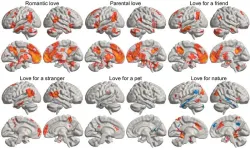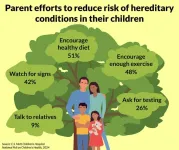(Press-News.org) A new Nature Human Behaviour study, jointly led by Dr Margherita Malanchini at Queen Mary University of London and Dr Andrea Allegrini at University College London, has revealed that non-cognitive skills, such as motivation and self-regulation, are as important as intelligence in determining academic success. These skills become increasingly influential throughout a child's education, with genetic factors playing a significant role. The research, conducted in collaboration with an international team of experts, suggests that fostering non-cognitive skills alongside cognitive abilities could significantly improve educational outcomes.
"Our research challenges the long-held assumption that intelligence is the primary driver of academic achievement," says Dr Malanchini, Senior Lecturer in Psychology at Queen Mary University of London. "We’ve found compelling evidence that non-cognitive skills – such as grit, perseverance, academic interest, and value attributed to learning – are not only significant predictors of success but that their influence grows stronger over time."
The study, which followed over 10,000 children from age 7 to 16 in England and Wales, employed a combination of twin studies and DNA-based analyses to examine the complex interplay between genes, environment, and academic performance.
The power of non-cognitive genetics
One of the most striking findings is the increasing role of genetics in shaping non-cognitive skills and their impact on academic achievement. By analysing DNA, researchers constructed a "polygenic score" for non-cognitive skills, essentially a genetic snapshot of a child's predisposition towards these skills.
"We discovered that genetic effects associated with non-cognitive skills become increasingly predictive of academic achievement over the school years, in fact their effect nearly doubles between the ages of 7 and 16" explained Dr Allegrini, Research Fellow at University College London. "By the end of compulsory education, genetic dispositions towards non-cognitive skills were equally as important as those related to cognitive abilities in predicting academic success."
This finding challenges the traditional view of educational achievement as determined largely by intelligence. Instead, the study suggests that a child's emotional and behavioural makeup, influenced by both genes and environment, plays a crucial role in their educational journey.
The role of environment
While genetics undoubtedly contributes to non-cognitive skills, the study also emphasises the importance of environment. By comparing siblings, researchers were able to isolate the impact of shared family environment from genetic factors.
"We found that while family-wide processes play a significant role, the increasing influence of non-cognitive genetics on academic achievement remained evident even within families," said Dr Allegrini. "This suggests that children may actively shape their own learning experiences based on their personality, dispositions, and abilities, creating a feedback loop that reinforces their strengths."
Implications for education
The findings of this study have profound implications for education. By recognising the critical role of non-cognitive skills, schools can develop targeted interventions to support students' emotional and social development alongside their academic learning.
"Our education system has traditionally focused on cognitive development," said Dr Malanchini. "It's time to rebalance that focus and give equal importance to nurturing non-cognitive skills. By doing so, we can create a more inclusive and effective learning environment for all students."
The study also highlights the need for further research into the complex interplay between genes, environment, and education. By understanding these factors, educators and policymakers can develop more effective strategies to support students' overall development and achieve better educational outcomes.
Dr Malanchini concluded, "This study is just the beginning. We hope it will inspire further research and lead to a transformation in how we approach education."
The study was a collaborative effort involving researchers from multiple institutions across six countries: University College London, VU University Amsterdam, University of Bologna, Royal Holloway, University of London, University of Oslo, University of York, Vrije Universiteit Amsterdam, Institute for Behavioral Genetics, The Max Planck Institute for Human Development, The University of Texas at Austin, Institute of Psychiatry, Psychology and Neuroscience, King's College London, and Queen Mary University of London. The research was funded by the Medical Research Council (MRC) of the UK Research and Innovation (UKRI).
END
Non-cognitive skills: the hidden key to academic success
New research reveals the growing importance of emotional intelligence in shaping educational outcomes
2024-08-26
ELSE PRESS RELEASES FROM THIS DATE:
Finding love: Study reveals where love lives in the brain
2024-08-26
We use the word ‘love’ in a bewildering range of contexts — from sexual adoration to parental love or the love of nature. Now, more comprehensive imaging of the brain may shed light on why we use the same word for such a diverse collection of human experiences.
‘You see your newborn child for the first time. The baby is soft, healthy and hearty — your life’s greatest wonder. You feel love for the little one.’
The above statement was one of many simple scenarios presented to fifty-five parents, self-described as being in a loving relationship. Researchers from Aalto University utilised ...
Researchers develop high-entropy non-covalent cyclic peptide glass
2024-08-26
Researchers from the Institute of Process Engineering (IPE) of the Chinese Academy of Sciences have developed a sustainable, biodegradable, biorecyclable material: high-entropy non-covalent cyclic peptide (HECP) glass. This innovative glass features enhanced crystallization-resistance, improved mechanical properties, and increased enzyme tolerance, laying the foundation for its application in pharmaceutical formulations and smart functional materials. This study was published in Nature Nanotechnology on ...
Mapping the sex life of Malaria parasites at single cell resolution, reveals the genetics underlying Malaria transmission
2024-08-26
Malaria is caused by a eukaryotic microbe of the Plasmodium genus, and is responsible for more deaths than all other parasitic diseases combined. In order to transmit from the human host to the mosquito vector, the parasite has to differentiate to its sexual stage, referred to as the gametocyte stage. Unlike primary sex determination in mammals, which occurs at the chromosome level, it is not known what causes this unicellular parasite to form males and females. New research at Stockholm University has implemented high-resolution genomic tools to map the global repertoire of genes ...
Communicating consensus strengthens beliefs about climate change
2024-08-26
Climate scientists have long agreed that humans are largely responsible for climate change. However, people often do not realize how many scientists share this view. A new 27-country study published in the journal Nature Human Behaviour finds that communicating the consensus among scientists can clear up misperceptions and strengthen beliefs about climate change.
The study is co-led by Bojana Većkalov at the University of Amsterdam and Sandra Geiger of the University of Vienna. Kai Ruggeri, professor of health policy and management at Columbia University Mailman School of Public Health, is the corresponding author.
Scientific consensus identifying humans as primarily ...
Almost half of FDA-approved AI medical devices are not trained on real patient data
2024-08-26
Artificial intelligence (AI) has practically limitless applications in healthcare, ranging from auto-drafting patient messages in MyChart to optimizing organ transplantation and improving tumor removal accuracy. Despite their potential benefit to doctors and patients alike, these tools have been met with skepticism because of patient privacy concerns, the possibility of bias, and device accuracy.
In response to the rapidly evolving use and approval of AI medical devices in healthcare, a multi-institutional team of researchers at the UNC School of Medicine, Duke University, Ally Bank, Oxford University, Colombia University, and University of Miami have been on a mission to build ...
Does the extent of structural racism in a neighborhood affect residents’ risk of cancer from traffic-related air pollution?
2024-08-26
High levels of traffic-related air pollutants have been linked with elevated risks of developing cancer and other diseases. New research indicates that multiple aspects of structural racism—the ways in which societal laws, policies, and practices systematically disadvantage certain racial or ethnic groups—may contribute to increased exposure to carcinogenic traffic-related air pollution. The findings are published by Wiley online in CANCER, a peer-reviewed journal of the American Cancer Society.
Most studies suggesting that structural racism, which encompasses factors such as residential segregation and differences in economic status and homeownership, may influence ...
2 in 3 parents want help preventing their child from developing hereditary health conditions
2024-08-26
ANN ARBOR, Mich. – Among things many families don’t wish to pass down to their children and grandchildren: medical issues.
One in five parents say their child has been diagnosed with a hereditary condition, while nearly half expressed concerns about their child potentially developing such a condition, a new national poll suggests.
And two thirds of parents want their healthcare provider to suggest ways to prevent their child from developing a health problem that runs in the family, according to the University of Michigan Health C.S. Mott Children’s Hospital National ...
Could psychedelic-assisted therapy change addiction treatment?
2024-08-26
by Amy Norton
PISCATAWAY, NJ – After years of being seen as dangerous “party drugs,” psychedelic substances are receiving renewed attention as therapies for addiction -- but far more research is needed, according to a new special series of articles in the Journal of Studies on Alcohol and Drugs, published at Rutgers University.
Psychedelics are substances that essentially alter users’ perceptions and thoughts about their surroundings and themselves. For millennia, indigenous cultures have used plants with psychedelic properties in traditional medicine and spiritual rituals. And for a time in the mid-20th ...
Sustaining oyster farming with sturdier rafts
2024-08-26
Amid the rising human population and pressure on food supplies, the world can’t be everyone’s oyster. But perhaps there might be more oysters to eat if an Osaka Metropolitan University-led research team’s findings mean sturdy plastic rafts will be used in their farming.
Conventional oyster farming uses bamboo rafts with additional flotation devices such as Styrofoam. Though relatively affordable, these rafts can be damaged in typhoons. The OMU-led researchers propose a polyethylene raft that keeps costs manageable but is about five times more durable than a bamboo raft.
OMU Graduate School of Engineering Associate ...
People of lower socioeconomic status less likely to receive cataract surgery in private clinics
2024-08-26
Despite increased funding for cataract surgeries to private, for-profit clinics, access to surgery fell 9% for lower-income people, according to new research published in CMAJ (Canadian Medical Association Journal) https://www.cmaj.ca/lookup/doi/10.1503/cmaj.240414.
“Unexpectedly, despite new public funding for operations provided in private for-profit surgical centres, which was intended to fully cover all overhead costs and remove the need to charge patients, this disparity did not decrease, but instead grew ...
LAST 30 PRESS RELEASES:
Scientists show how to predict world’s deadly scorpion hotspots
ASU researchers to lead AAAS panel on water insecurity in the United States
ASU professor Anne Stone to present at AAAS Conference in Phoenix on ancient origins of modern disease
Proposals for exploring viruses and skin as the next experimental quantum frontiers share US$30,000 science award
ASU researchers showcase scalable tech solutions for older adults living alone with cognitive decline at AAAS 2026
Scientists identify smooth regional trends in fruit fly survival strategies
Antipathy toward snakes? Your parents likely talked you into that at an early age
Sylvester Cancer Tip Sheet for Feb. 2026
Online exposure to medical misinformation concentrated among older adults
Telehealth improves access to genetic services for adult survivors of childhood cancers
Outdated mortality benchmarks risk missing early signs of famine and delay recognizing mass starvation
Newly discovered bacterium converts carbon dioxide into chemicals using electricity
Flipping and reversing mini-proteins could improve disease treatment
Scientists reveal major hidden source of atmospheric nitrogen pollution in fragile lake basin
Biochar emerges as a powerful tool for soil carbon neutrality and climate mitigation
Tiny cell messengers show big promise for safer protein and gene delivery
AMS releases statement regarding the decision to rescind EPA’s 2009 Endangerment Finding
Parents’ alcohol and drug use influences their children’s consumption, research shows
Modular assembly of chiral nitrogen-bridged rings achieved by palladium-catalyzed diastereoselective and enantioselective cascade cyclization reactions
Promoting civic engagement
AMS Science Preview: Hurricane slowdown, school snow days
Deforestation in the Amazon raises the surface temperature by 3 °C during the dry season
Model more accurately maps the impact of frost on corn crops
How did humans develop sharp vision? Lab-grown retinas show likely answer
Sour grapes? Taste, experience of sour foods depends on individual consumer
At AAAS, professor Krystal Tsosie argues the future of science must be Indigenous-led
From the lab to the living room: Decoding Parkinson’s patients movements in the real world
Research advances in porous materials, as highlighted in the 2025 Nobel Prize in Chemistry
Sally C. Morton, executive vice president of ASU Knowledge Enterprise, presents a bold and practical framework for moving research from discovery to real-world impact
Biochemical parameters in patients with diabetic nephropathy versus individuals with diabetes alone, non-diabetic nephropathy, and healthy controls
[Press-News.org] Non-cognitive skills: the hidden key to academic successNew research reveals the growing importance of emotional intelligence in shaping educational outcomes





